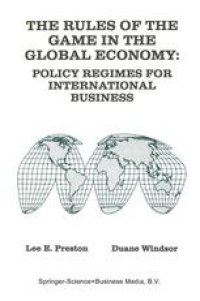
Ebook: The Rules of the Game in the Global Economy: Policy Regimes for International Business
- Tags: Business/Management Science general, Social Sciences general, International Economics
- Year: 1992
- Publisher: Springer Netherlands
- Edition: 1
- Language: English
- pdf
This study has been long in the making, and the world has changed dramatically while we have been at work. We initially anticipated a substantial section on the Soviet-dominated Council for Mutual Economic Assistance (CMEA or "COMECON"), which offered an interesting contrast to the kind of international business regime typically found among market-oriented countries and industries. As we moved toward publi- tion, the CMEA vanished, and so we mention it only in passing. The USSR subsequently disintegrated into a Commonwealth of Independent States (CIS). On the other hand, we began with the assumption that the historic "rule of capture" no long played a significant role in international economic relations. The seizure of Kuwait's territory and wealth by the government of Iraq suggests that this assumption was heavily influenced by wishful thinking. Even though this seizure has been reversed by military action, the experience remains a challenge to generally held beliefs about the strength of "order" versus "chaos" in contemporary international affairs. Some readers of this volume have suggested that it gives insufficient attention to the fact that many of the important business and economic regimes of the postwar period are currently under significant pressure, perhaps even in danger of collapse. We acknowledge that there are many evidences of strain in, for example, the free trade and money exchange regimes, and in many areas of environmental protection.
This book analyzes the evolution of `international policy regimes' affecting the development and management of international business. The authors explain the nature of international regimes, and show how the interlinked processes of global economic integration and multinational enterprise expansion make the development of regimes both inevitable and desirable. They then examine several major types of regimes currently in place, including those that have emerged from global or regional institutions such as the United Nations (UN) and the European Community (EC), as well as those dealing with functional areas such as international trade and payments, sea and air transportation, and environmental issues. They conclude with an assessment of the critical similarities and differences among existing regimes, the most likely direction and scope of future regime development and the important implications of regime evolution for international management.